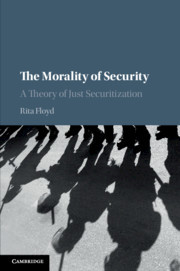Description
The Morality of Security
A Theory of Just Securitization
Author: Floyd Rita
Offers an innovate approach to ethics and security, combining securitization theory and the just war tradition.
Language: English
Subject for The Morality of Security:
Approximative price 30.28 €
In Print (Delivery period: 14 days).
Add to cart
The Morality of Security
Publication date: 09-2021
Support: Print on demand
Publication date: 09-2021
Support: Print on demand
Approximative price 107.80 €
In Print (Delivery period: 14 days).
Add to cart
The Morality of Security
Publication date: 04-2019
258 p. · 15.5x23.3 cm · Hardback
Publication date: 04-2019
258 p. · 15.5x23.3 cm · Hardback
Description
/li>Contents
/li>Biography
/li>
When is it permissible to move an issue out of normal politics and treat it as a security issue? How should the security measures be conducted? When and how should the securitization be reversed? Floyd offers answers to these questions by combining security studies' influential securitization theory with philosophy's long-standing just war tradition, creating a major new approach to the ethics of security: 'Just Securitization Theory'. Of interest to anyone concerned with ethics and security, Floyd's innovative approach enables scholars to normatively evaluate past and present securitizations, equips practitioners to make informed judgements on what they ought to do in relevant situations, and empowers the public to hold relevant actors accountable for how they view security.
Introduction; Just securitization: raison d'être and feasibility; Just securitization theory: basic ideas; Research questions and suggested criteria of just securitization and just desecuritization; Overview of all chapters; 1. Ethics and the study of security; 1.1. Introduction; 1.2. Security: a two-fold distinction; 1.3. The ethics of security as a state of being; 1.4. The ethics of security as a set of social and political practices; 1.5. Conclusion; 2. Framework: the meaning of securitization and the method of JST; 2.1. Introduction; 2.2. The meaning of securitization in Just Securitization Theory; 2.3. Method; 2.4 Conclusion; 3. Just initiation of securitization: just reason; 3.1. Introduction; 3.2. The just reason; 3.3. Threat categories; 3.4. Agent-intended threats; 3.5. Agent-lacking threats; 3.6. Agent-caused threats; 3.7. Future objective existential threats; 3.8. Conclusion; 4. Just initiation of securitization: just referent object; 4.1. Introduction; 4.2. The just referent object; 4.3. Human needs as a measure of human well-being; 4.4. Needs satisfaction, scale and moral justification; 4.5. Political and social orders; 4.6. Ecosystems and non-human species; 4.7. Human beings; 4.8. Conclusion; 5. Just initiation of securitization: right intention, macro-proportionality and reasonable chance of success; 5.1. Introduction; 5.2. Sincerity of intention; 5.3. Macro-proportionality; 5.4. Reasonable chance of success; 5.5. Omissions: Legitimate authority and last resort; 5.6. Conclusion; 6. Just conduct in securitization; 6.1. Introduction; 6.2. Targeted security measures; 6.3. Least harmful option; 6.4. Just conduct of executors of securitization; 6.5. Moral exemptions to just conduct in securitization; 6.6. Moral culpability and individual agents in unjust securitization; 6.7. Conclusion; 7. Just termination of securitization; 7.1. Introduction; 7.2. What is the meaning of desecuritization in Just Securitization Theory?; 7.3. Does just desecuritization need to follow from just securitization?; 7.4. Who can desecuritize?; 7.5. Who is required to desecuritize?; 7.6. Timing; 7.7. Action; 7.8. Long-term aim; 7.9. Conclusion.
Rita Floyd is Lecturer in Conflict and Security at the Department of Political Science and International Studies, University of Birmingham. Her books include Security and the Environment: Securitisation Theory and US Environmental Security Policy (Cambridge, 2010) and her articles have appeared in journals including the Review of International Studies, Security Dialogue, and the Journal of International Relations and Development, amongst others.
© 2024 LAVOISIER S.A.S.




